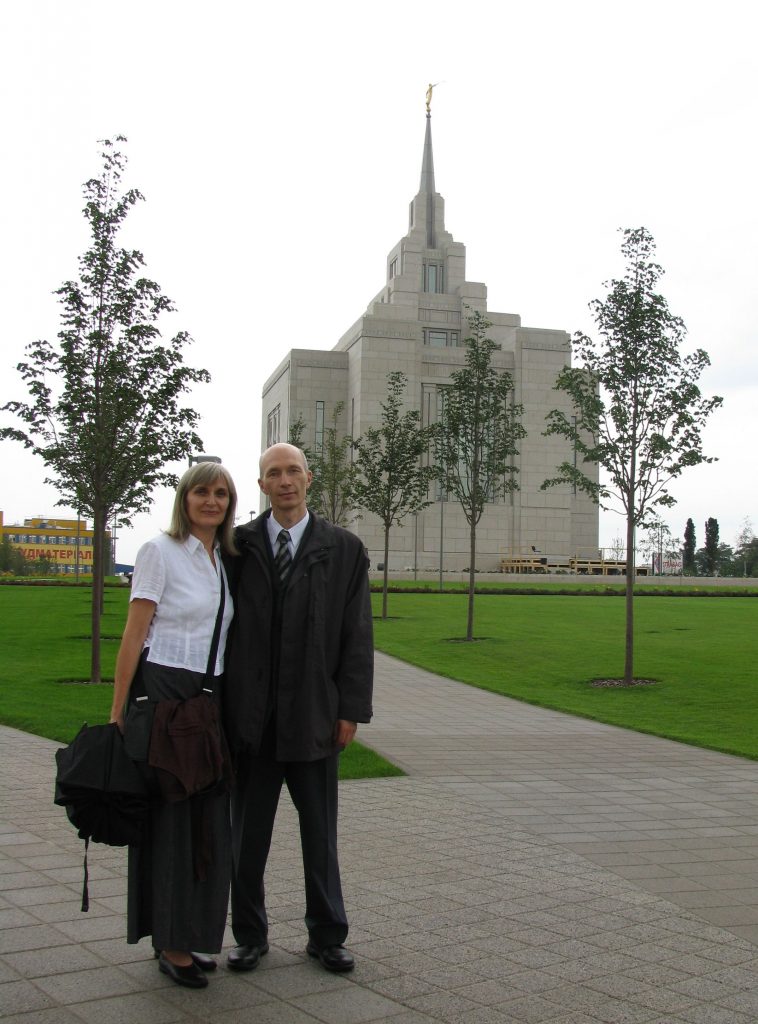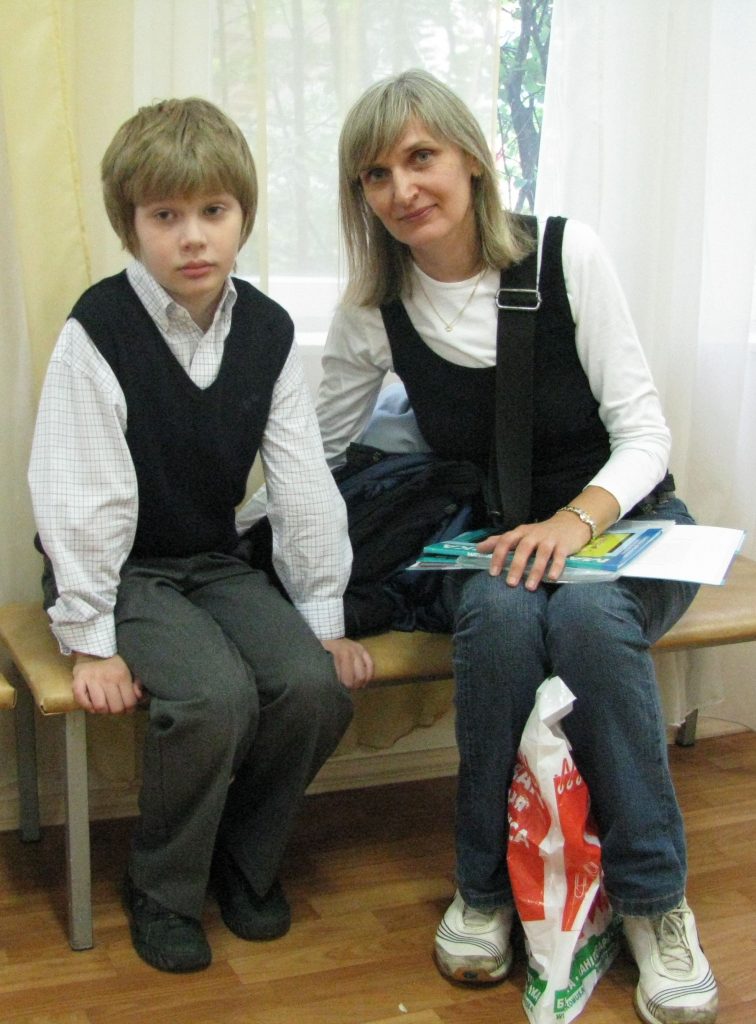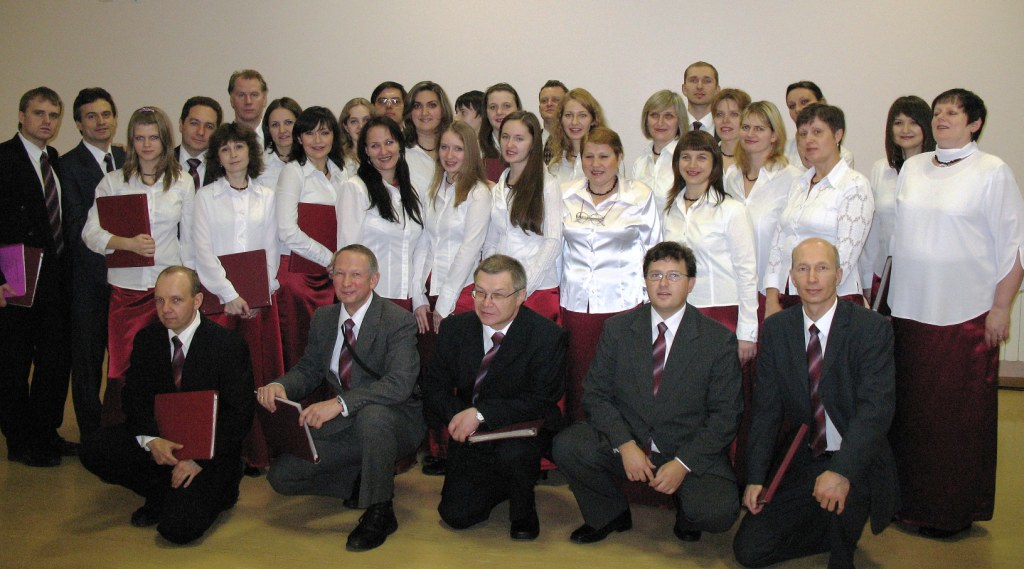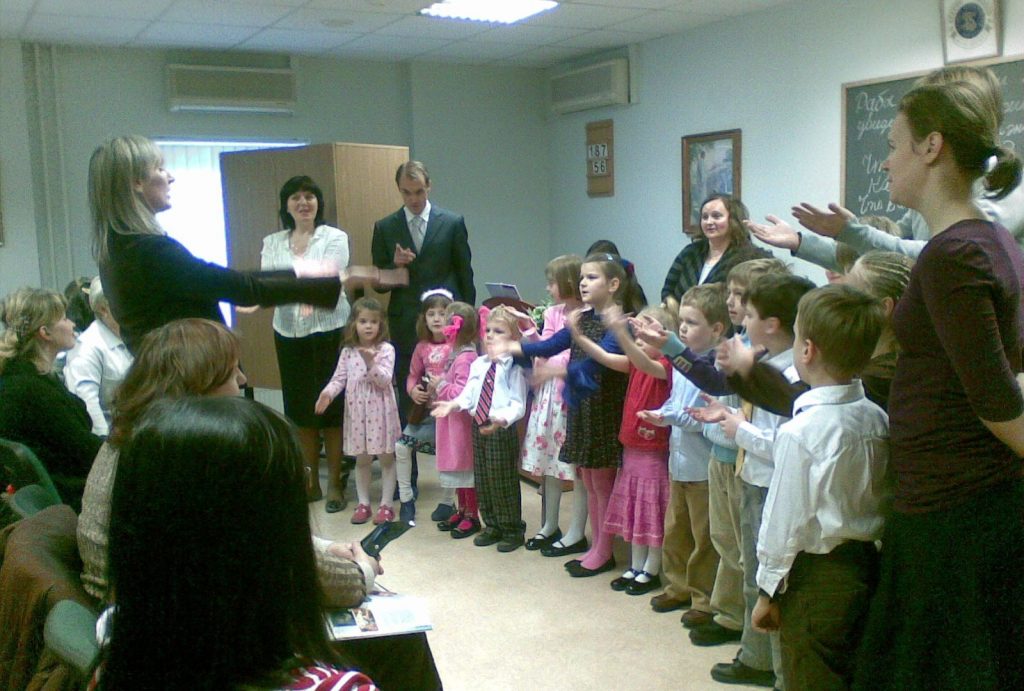As an early member of the Church in Moscow, Tatiana was an essential contributor to the establishment of the gospel in Russia. For seven years, she led a choir of church members that sang hymns and folk songs, toured with their performances and recorded albums. Tatiana speaks astutely about the impact of Russian culture on spirituality in her country and about the tremendous work she’s put into building the Church in her homeland.
What was your religious background before you learned about the Church?
I had nothing to do with religion. Nothing at all whatsoever. My parents were rather atheist. It was that kind of a time; everyone figured that God didn’t exist, and we didn’t talk about it at home. I just never thought about it. I only started thinking about it because my husband, Alexei, brought it up. He had been thinking about it, and we started to discuss it.
One day we had an active discussion for a long time. We decided that we needed religion somehow. We figured that God existed and we believed in Christ. We realized that we knew God was in heaven and we are here on earth, and we wanted to somehow formalize our relationship with him. We thought a lot about how to do it. We have the Russian Orthodox Church here in Russia, so we decided we needed to be baptized and build some kind of relationship with the Church. That was in 1993. We thought about it for a long time, and then were baptized. It was a completely conscious decision. We were baptized by full immersion in water. We found a very good priest who could discuss things with us, complete immersion in water, all as it should be. It was in a church. Not all churches do it, but we found a church that did it that way, because we knew that there should be total immersion in water.
Had you read the Bible?
We read it all, and that’s how we learned baptism should be done by complete immersion in water. After that we were baptized.
A month and a half or two months went by, and we met missionaries, Elders Tobias Bradford and Garth Quigley. They saw us on the metro. The whole family was walking together. We had just come out of the Tretyakov Gallery; it was the weekend. They saw us and ran after us in the metro, which was quite crowded. The Spirit probably prompted them and they ran after us. They overtook us and stopped us, panting, and started talking with us, and we became interested. I thought, “We’ll explain everything to them. They just don’t understand. We’ll just explain everything.” So we invited them to visit. That’s how we began to listen to the discussions, and it turned out to be very interesting.
We had very strong missionaries. The Lord knew to send them to us. We talked a lot and went through all the discussions. But because we felt that our baptism was true and that we had already done what was necessary, we went a whole year as investigators. We didn’t miss one meeting. We even tried to pay tithing, but they didn’t accept it. We liked everything about the Church. We had English lessons in our home and were always very active. And then a year later, we all got our answers that we all should be baptized again, but into the Church of Jesus Christ of Latter Day Saints. I got my answer first, but I received an answer that I should listen to my husband. I felt that I wanted to be baptized, but that I should be with him. We were baptized together on May 7, 1994 in the Moscow River. It was very cold, but it didn’t matter.
Were there any other obstacles to your joining the Church?
No, it was just that we thought that our first baptism was true. We felt that we had made a covenant with God. It wasn’t clear to us why we should do it again. But then something happened. We read more. It wasn’t like someone could just explain that it should be a certain way. No, it had to come from an inner witness that we should commit an act of obedience and join this Church because there was a fullness of the priesthood. We had long before received a testimony that the Church was true and that the Book of Mormon was true. They were very bright, these testimonies.
What changes did you see in your life after you were baptized?
First of all, our very way of life changed, but that changed after we came to church. After baptism, we had a changed sense of accountability. I felt a great responsibility that I had been baptized and was now accountable. I had made a covenant with God and had to do my part. Because the Church was very young in Russia and we were the face of the Church to some extent, I had to work very hard to create something. Now we have a church building, many active Church members and priesthood holders, many wonderful sisters. But back then there were very few people.
There weren’t very many branches then, and there were few people in each branch. Because of this, one person would have many callings, whereas now we have just one calling and they try not to give a second calling to anyone. But at that time I was immediately called as a Sunday school teacher, and I prepared a lesson every Sunday. I was also the music director. At the same time, a little while later, I was an Institute teacher and taught two classes a week. My husband was working for the Church Educational System. It was like full-time employment. And one of the classes was completely in English. It was very difficult, because I’m not fluent in English, and it required a lot of effort. Not that I was special in any way – many people served in several callings. I wasn’t called to do this, but I also organized many different activities: picnics, goodbye parties for missionaries. The missionaries were always very close to us at that time, like members of the family, and it was like tearing out a piece of our heart when they left. A missionary would leave the branch, and everyone would be in tears. This isn’t generally the case anymore. But it was natural then. It was a step in the Church’s development.
We also had a choir on and off, and I felt by the Spirit that we needed to start it up again. So I took on that responsibility and in time we grew into a wonderful choir. I led the choir for many years, from 1995 to 2002. I stopped leading the choir when our youngest son was born. Two wonderful conductors, Julia Burykina and Alexander Prach, continued to lead the choir and did great work. We recorded two CDs. It was certainly not the Tabernacle Choir, but we sang the hymns with the Spirit, and recorded them with a strong spirit. We traveled to different cities, including St. Petersburg, Voronezh, Nizhny Novgorod, and Khmelnitsky, in Samara. We traveled on our own dime and gave concerts. There was a strong spirit in Voronezh, and after our concerts there were many baptisms. It was such a strong spirit. We also gave concerts in Kharkov and Kiev, in the Ukraine.
What kind of music did you sing?
Mostly we sang hymns, but we also sang folk songs. This was one of the most wonderful chapters of my life. As a child I sang in a very good choir. It was a professional children’s choir. We rehearsed three times a week for two-and-a-half hours. I never imagined when I finished school that it would someday come in handy. Later, when I started conducting in the ward, I felt that I had a knack for it. We prepared a musical number and it turned out really well. That’s actually why I took up the choir, because I saw that it worked. The Lord gives us these talents when they’re needed. It just opened up to me like the gifts of the Spirit described in the scriptures. It was given as a gift. I never in my life planned for it. I lived my life, and it just happened in such a magical way.
How many people sang in the choir?
We had about 30 people from various branches. At first the missionaries helped us. After a while they stopped because they weren’t allowed to, but they weren’t necessary. We did have some problems finding male voices, but they turned up. Fewer men in general can sing. The second problem is getting them to come to sing, since they are always busy.
We had basses, we had tenors – my whole family sang. My oldest son at first sang soprano, then alto, then he didn’t sing at all, and finally he started singing bass. My daughter also sang, and my husband sang bass. Rehearsals were on Sunday. We all went together from church meetings to choir practice. First we met in an apartment.
We always participated in the choir, and my oldest son even found a wife in the choir. She sang alto. She also played the piano, and now they’re married and have two children. So there were many blessings. We even went to Stockholm. The entire choir traveled to the temple there and gave a concert. We had a wonderful concert there. Even the temple president came and gave us letters that we could keep to remember the evening. Everyone loved it. There was a very strong spirit, which was the most important thing; the Spirit was there. The best thing about our choir was the very strong, special spirit with which we sang. It was very cool.
I have also been a teacher in the Church all my life. At this time I was still a seminary teacher. I taught my own children.
And did you sense that your education as a teacher also prepared you for this calling?
Yes. I was an institute teacher, then a seminary teacher. We began on another schedule, so to get on the same cycle as the rest of the Church, we ended up studying the Old Testament two years in a row. It was a special blessing. It became my favorite book. I have such a strong testimony of our church thanks to the Old Testament. I realized this is how things should be, the relationship of a prophet with God and with the people. It’s amazing. All of these prophets became like my close friends, I don’t know how to explain it. Once I was teaching a lesson on the Old Testament in Sunday school. A sister said to me, “You’re talking about David as though he is your friend, as if you drank tea with him yesterday and now you’re telling us about him.” Another time we stopped in at an Orthodox church. Sometimes there is a priest who reads the Bible. He reads it in Old Church Slavonic, but you can still understand something. I heard the priest reading a story about David. I thought, “He’s reading about my David.” I think of him as such a familiar person.
Has it always been easy for you to grow in the Church and stay active, or were there any challenges after your baptism?
Well, there was just so much to do. We just had to move forward. There was no time to stop. I ran, ran, ran and only stopped when my son Ilya was born.
Besides all there was to do, we started taking trips to the temple and became temple workers. It was interesting that we were called as temple workers when we hadn’t even been members of the Church for a year yet. Alexei’s brother, Dmitri, was baptized, too. He was going to the temple to be sealed to his wife, Sveta, but we were still two weeks away from our year mark as members. We were allowed into the temple two weeks early to attend the sealing of Dmitri’s family. On the trip they called us as temple workers.
It was such a good period of life. Doing so much can’t and shouldn’t be like that now. Not all people are in a position to serve so much. But at that time it was needed. Because, well, if not us, then who else?
And I understand that your husband has also always had many callings. Was it difficult for you to always be so busy?
Somehow we just didn’t think about it. It was probably hard. But frankly, we received so much joy and so many blessings from it, I can’t even say it was hard. If it had felt hard, I might not have done it.
The Lord probably blessed me in a special way. It was certainly difficult, of course; it took up so much time, but the joy from it was so great. We saw the fruits. We saw the results. I always liked to teach because it was my profession, and here I was actually realizing my potential. I had so much to do; there was no time at all to feel bored. And I realized so many of my talents.
Do you think the Church is Russia has distinct characteristics? How would you explain it?
I think the Church in any country has its own character because you have your own way of thinking, your own cultural traditions. These inevitably leave a mark. The Church in Japan is not like the Church in Russia, because they have very different preconceptions and understandings. They have a different way of understanding what is good and what is bad because of how they have always lived.
It’s the same here. Russia has its own peculiarities. Thanks to the Orthodox Church, the Russian people have thought a lot about Christian beliefs in terms of spirituality, and they have a disdain for the material world – meaning that the material world is bad, and the spiritual is everything. This is important. And since everyone can’t be extremely spiritual, they consider themselves inherently quite sinful. Only monks and special priests can be very spiritual. The way they relate to the Church is very complicated because there were so many priests who didn’t conduct themselves worthily, who could be compared to the villains in a Russian folk tale.
That’s also part of our national character concerning leaders and government. We don’t feel a need to listen to them. The people and the state are separate. It is a national characteristic. In certain countries, it’s one way, and for us, it’s another.
How does this influence the character of the LDS Church in Russia?
First, it’s difficult for people to obtain testimonies. It’s more difficult to obtain a testimony that Joseph Smith was a prophet, because who is that? Then there is the relationship to leadership in the Church. Church leaders should be obeyed. It’s difficult for us to obtain a testimony that we should obey our leaders. We don’t always obey, and it was even a kind of special display of courage not to obey state leaders. It’s always kind of been that way.
So, on the one hand, we have deep spirituality, because spiritual things were always revered. But the deepest spirituality is impossible to achieve, we are always sinful, always bad. This belief leaves a psychological imprint. It was very important for the Russian people, and it’s probably because of this that we have such beautiful Russian literature and music. We have very deep feelings, but at the same time there is a big economic gap. On the one hand, people have great spirituality and inner wisdom, and on the other hand, there is great ignorance.
How would you say your extensive church service has helped strengthen your testimony?
To be a member of the Church is a lot of spiritual work. It’s also like the parable of the laborers in the vineyard. One came earlier, another came later, but no matter when you come, the important thing is whether you endure to the end and preserve your testimony.
When people join the Church, they have such euphoria. It’s something new, something interesting. It’s unusual for them, and there are interesting activities and interactions. Then later you have to constantly strengthen your testimony because there are many trials from different directions, things you don’t expect. But there is also a huge sense that God is watching us and that He lets us see life from all sides.
If you don’t serve in the Church, big temptations come. I especially felt that when I had my first baby. Thoughts like, “I’ve done so much, now I can relax.” As soon as you start thinking like that, you move backwards. It’s not a coincidence. It’s the law of growth. It’s like a plant. If something has a place to grow, it must grow. It doesn’t stop until it’s time, and then other processes start. It begins to bloom, then fades, and then gives seeds. And then it dies, and then rises and grows again in an endless process. We are like that. We can’t stop, ever. We can never relax and say, “Look, we’ve done everything, and we’re so good that now we can relax.”
We can’t ever rest spiritually. This is my message, that we always have to strive and we always have to serve. We can’t say, I served, now let others serve. It’s important to serve in everything you can. If you’re a visiting teacher, then be a visiting teacher. It’s a calling. It’s something you’re trusted with.
There will come a time when it seems difficult to do even that, for various reasons. They may be objective reasons or subjective reasons. It doesn’t matter. If you do what the Lord has asked you to do, that’s what’s important. And you don’t stop. Even if there are problems, gradually, somehow, things get resolved. You just can’t stop.
At A Glance
Tatiana Marchenko
 Location: Moscow, Russia
Location: Moscow, Russia
Age: 49
Marital status: Married
Children: Three (ages 26, 24 and 7)
Convert? May 7, 1994
Language: Russian
Interview by Allison Pond. Photos used with permission.
At A Glance





